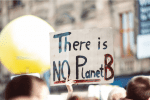Pictured: Marc Coleman chairing a discussion between World Trade Organisation Director Peter Sutherland and World Bank Chief Economist Justin Liu on free trade at the 2009 “Founders” summit (preceding the Web Summit)
Marc Coleman, economist and founder of Octavian Consulting, discusses the potential in free trade to save the world economy
Trade transforms
From well below it in the 1960s, Ireland’s living standards compared to the EU average are now well above it. And despite Covid-19, that is where they will stay. The reason for this? One word: Trade. From trading far too little in our first half century of independence, we have made up for this in last five decades by becoming one of the world’s most open and successful trading nations. From €189 billion in 2013 – already impressive – our exports in constant price terms rose to €441 billion in 2019, powering one of the world’s most impressive recoveries ever recorded pushing our GDP and GNP up by 73 and 53 per cent, respectively . To be sure, this performance is dominated by the multinational sector.
As argued in “An Economic Response to Covid-19,” closer collaboration between the MNC and SME sector will be crucial to recovery. But that’s another day’s article. At 130 per cent of GDP our export share makes free trade crucial to our economy.
As the “first wave” of Covid-19’s economic impact – the closure the domestic economy – slowly abates we will, sadly, begin to experience a “second wave” of falling export demand, hitting manufacturing outlets and tradeable services. For the multinational sector falling imports will match exports leaving the impact neutral. For indigenous exporters, however – particularly those exposed to economies more affected by Covid-19 – the impact could be brutal.
China – which powered world growth through the last global recession – has officially abandoning its growth target, an ominous sign. The US and UK – critical markets for Ireland – are likely to be hit hard too. Germany, thanks to an efficient economy and huge response of its government, less so (Germany has committed up to €978 billion in emergency business funding – one quarter of German GDP). At present, I am working on a report promoting exports to Germany to help sectors hardest hit by Brexit. What applies to Brexit also applies to Covid-19: Building on the government’s “Ireland Connected” strategy for trade and investment, we need to immediately find the economies and sectors least affected by Covid-19 and diversity in their direction.
A bigger danger than a trade downturn will be the political response to it. Contrary to popular belief the Great Depression was not caused by the 1929 stock market, but by the US “Smoot Hawley” Tariff act a year later. As the world’s largest economy protected its industries, others followed, and global trade contracted by over one third. Employment collapsed. And the rest, as they say, is history. Those who forget history, are doomed to repeat it. 90 years after that disastrous mistake, a US Presidential election could push world trade over the edge.
For most of those 90 years we have enjoyed unprecedented prosperity because bodies like the General Agreement on Trade and Tariffs (GATT) reversed the mistakes of the 1930s and helped lift the world out of depression.
Ireland’s contribution to this is significant: In 1995 GATT became the World Trade Organisation and its first Director – Peter Sutherland – pushed the benefits of free trade from the western world to Asia and Eastern Europe as well. Africa remains a challenge, to which end I have started an initiative “The Irish African Business Council.” Replicating the work of our missionaries and diplomats in the last century this project aims to use our reputation as a trusted partner of Africa to drive sustainable ethical trade partnership in a vast market of over 1 billion people.
Asia remains crucial. In 2014, I wrote “Unlocking Asia’s Trade potential for Ireland” measuring the mouth-watering potential for Irish trade growth. That year I also visited the current WTO Director Roberto Azevedo in Geneva to secure his support for a World Trade summit, an idea that never materialised but whose time has now arguably come. Even in a recession, Ireland’s smallness and Asia’s vastness gives us the potential to achieve extraordinary growth by leveraging our excellent “Team Ireland” network of diplomats and trade professionals.
There are two caveats. The first we cannot control but can influence. The second we can and most control. The first is that as unemployment soars politicians will be tempted by siren voices to return to protectionism. Using Ireland’s global kudos – under the “Global Ireland” banner – we must make the case for free trade: The second is that unless we confront the high cost burden imposed on competitive business by our sheltered sector, our recovery will leave over half our economy and people behind, with devastating political and social consequences.






